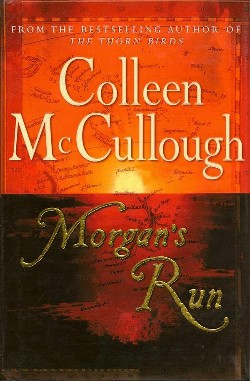 First UK edition | |
| Author | Colleen McCullough |
|---|---|
| Language | English |
| Genre | Historical novel |
| Publisher | Century (UK) Simon & Schuster (US) |
Publication date | 31 August 2000 |
| Publication place | Australia |
| Media type | Print (hardback & paperback) |
| ISBN | 0-7126-8046-2 |
| OCLC | 44533284 |
| Morgan's Run The Musical | |
|---|---|
| Music | Gavin Lockley |
| Lyrics | Gavin Lockley |
| Book | Colleen McCullough |
| Basis | Morgan's Run the book based on the voyage of the First Fleet and colonisation of Australia. |
| Productions | 2011 Springwood Civic Centre |
Morgan's Run is a historical novel by Colleen McCullough published in 2000. [1]